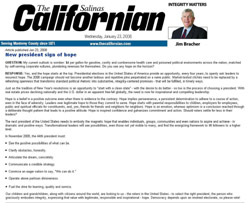Integrity Matters
August 20, 2008
We can stand to lose the hyphen
 Question: (E-357)
Question: (E-357)
When did certain citizens of the United States determine that simply describing themselves as Americans was no longer adequate? When did it become politically-correct to hyphenate one's citizenship with previous status regarding nation, culture or race? With the exception of indentured servants, primarily from Europe, and slaves, mostly from Africa, the majority of immigrants came to America intentionally. They evaluated their existing, often frustrating, circumstances, looked for positive opportunities, packed up and moved to America. How surprising would it have been to hear the young nation's first President, George Washington, refer to himself as an English-American? Certainly, not after the Revolutionary War!
As waves of immigrants arrived, they were called by some U.S. citizens who had preceded them, and, often with a tone of disdain, at least for a few generations: those Irish, Germans, Poles, Italians, Greeks, Africans, Serbs, Russians, Slovaks, Chinese, Mexicans, Jews, Asians, Hispanics, and Scots and on and on. As they integrated into the great "melting pot," adopting language and culture - some even Americanizing their names - most found acceptance and success.
The Rev. Dr. Martin Luther King Jr., in his "I Have A Dream" speech two generations ago, encouraged our nation to "... Judge other people by the content of their character and not the color of their skin." Do hyphenated references to one's earlier roots do much to support King's dream? Is the hyphenated descriptor encouraging inclusion or exclusion? Does it connect us or divide us?
Lee Bussard, in his book, "More Alike than Different," makes a strong case that what we should emphasize is what we have in common. Lee was born with cerebral palsy, and rather than trying to explain away its dramatic muscular limitations, he transformed them. By the time he finished speaking to leaders, they no longer saw his braces, nor were confounded by his laborious speech pattern. His disability was simply a different ability. So it is in America, it is our differences that create the fabric.
Going forward, as a capitalistic, representative democracy, how will the United States continue to leverage its multiculturalism and focus on what unites its people, as opposed to what separates them? Unlike other nations and cultures, the U.S. is a gathering of many different people - rightfully proud of their roots, yet equally eager to pledge allegiance to an American dream: E pluribus unum - Latin for "Out of Many, One." More about this, next week.
Switzerland has three official languages: German, French and Italian. Yet, its citizens are not hyphenated. They are simply Swiss!
Continuing to celebrate and respect the integrity of our complex and rich history, what will it take for all citizens to believe and say simply and proudly: "I am an American?"